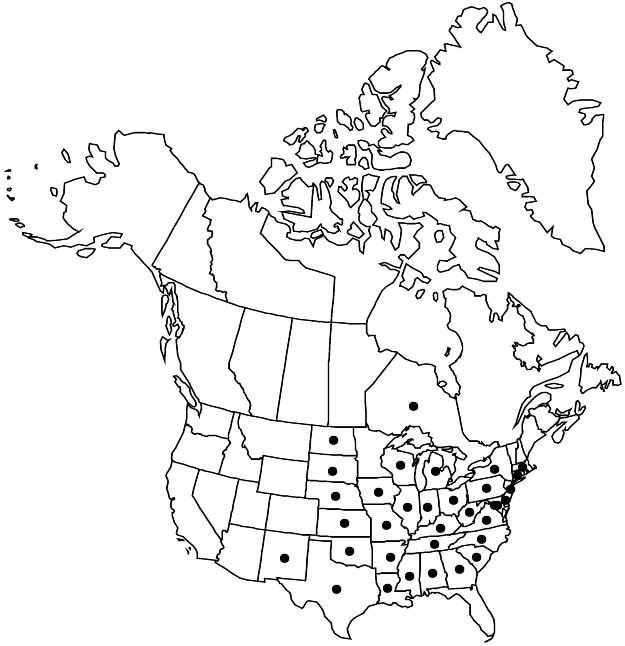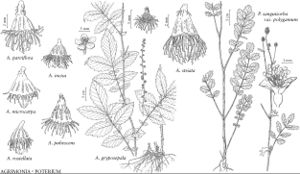Difference between revisions of "Agrimonia parviflora"
Hort. Kew. 2: 130. 1789.
FNA>Volume Importer |
imported>Volume Importer |
||
| (6 intermediate revisions by 2 users not shown) | |||
| Line 9: | Line 9: | ||
|special_status={{Treatment/ID/Special_status | |special_status={{Treatment/ID/Special_status | ||
|code=F | |code=F | ||
| − | |label= | + | |label=Illustrated |
}} | }} | ||
|basionyms= | |basionyms= | ||
| Line 15: | Line 15: | ||
|name=Agrimonia polyphylla | |name=Agrimonia polyphylla | ||
|authority=Urban | |authority=Urban | ||
| − | }}{{Treatment/ID/Synonym | + | |rank=species |
| + | }} {{Treatment/ID/Synonym | ||
|name=A. serrifolia | |name=A. serrifolia | ||
|authority=Wallroth | |authority=Wallroth | ||
| − | }}{{Treatment/ID/Synonym | + | |rank=species |
| + | }} {{Treatment/ID/Synonym | ||
|name=A. suaveolens | |name=A. suaveolens | ||
|authority=Pursh | |authority=Pursh | ||
| + | |rank=species | ||
}} | }} | ||
|hierarchy=Rosaceae;Rosaceae subfam. Rosoideae;Rosaceae tribe Agrimonieae;Agrimonia;Agrimonia parviflora | |hierarchy=Rosaceae;Rosaceae subfam. Rosoideae;Rosaceae tribe Agrimonieae;Agrimonia;Agrimonia parviflora | ||
| Line 36: | Line 39: | ||
|elevation=0–1100 m | |elevation=0–1100 m | ||
|distribution=Ont.;Ala.;Ark.;Conn.;Del.;D.C.;Ga.;Ill.;Ind.;Iowa;Kans.;Ky.;La.;Md.;Mass.;Mich.;Miss.;Mo.;Nebr.;N.J.;N.Mex.;N.Y.;N.C.;N.Dak.;Ohio;Okla.;Pa.;S.C.;S.Dak.;Tenn.;Tex.;Va.;W.Va.;Wis.;West Indies (Dominican Republic);introduced in South America (Argentina;s Brazil). | |distribution=Ont.;Ala.;Ark.;Conn.;Del.;D.C.;Ga.;Ill.;Ind.;Iowa;Kans.;Ky.;La.;Md.;Mass.;Mich.;Miss.;Mo.;Nebr.;N.J.;N.Mex.;N.Y.;N.C.;N.Dak.;Ohio;Okla.;Pa.;S.C.;S.Dak.;Tenn.;Tex.;Va.;W.Va.;Wis.;West Indies (Dominican Republic);introduced in South America (Argentina;s Brazil). | ||
| − | |discussion=<p>Plants of Agrimonia parviflora with major leaflet blades narrowly elliptic and with acute apices are occasionally found throughout the range. Eupatorium parviflorum (Aiton) Nieuwland is an illegitimate name that pertains here.</p> | + | |discussion=<p>Plants of <i>Agrimonia parviflora</i> with major leaflet blades narrowly elliptic and with acute apices are occasionally found throughout the range. <i>Eupatorium</i> parviflorum (Aiton) Nieuwland is an illegitimate name that pertains here.</p> |
|tables= | |tables= | ||
|references= | |references= | ||
| Line 45: | Line 48: | ||
-->{{#Taxon: | -->{{#Taxon: | ||
name=Agrimonia parviflora | name=Agrimonia parviflora | ||
| − | |||
|authority=Aiton | |authority=Aiton | ||
|rank=species | |rank=species | ||
| Line 59: | Line 61: | ||
|publication title=Hort. Kew. | |publication title=Hort. Kew. | ||
|publication year=1789 | |publication year=1789 | ||
| − | |special status= | + | |special status=Illustrated |
| − | |source xml=https:// | + | |source xml=https://bitbucket.org/aafc-mbb/fna-data-curation/src/2e0870ddd59836b60bcf96646a41e87ea5a5943a/coarse_grained_fna_xml/V9/V9_510.xml |
|subfamily=Rosaceae subfam. Rosoideae | |subfamily=Rosaceae subfam. Rosoideae | ||
|tribe=Rosaceae tribe Agrimonieae | |tribe=Rosaceae tribe Agrimonieae | ||
Latest revision as of 22:57, 5 November 2020
Herbs, 5–20 dm. Roots: tubers absent. Stems with glistening glandular hairs (stipitate and sessile) and pubescent to villous and hirsute (hairs stiff, scattered, erect, 2–3 mm). Leaves: mid cauline stipules ± falcate, margins dentate, apical lobes long-attenuate; major leaflets 3–19 (mid cauline 9–13), minor 1–4 pairs; major leaflet blades lanceolate to narrowly elliptic, rarely narrowly rhombic, terminal largest, largest of these 3.4–8.5 × 1.2–2.4 cm, margins serrate to dentate, apex acuminate or long-acuminate, rarely acute, abaxial surface usually glistening with sessile-glandular hairs and pubescent to villous and hirsute (hairs stiff, ± scattered, 1–3 mm, densest along major veins). Inflorescences: axes glistening with sessile-glandular hairs and pubescent to villous and hirsute (hairs scattered, ± erect, 1–2 mm, usually lacking distally). Flowers usually ± subopposite. Fruiting hypanthia broadly campanulate to broadly turbinate, rarely broadly obconic or hemispheric, 1.3–3 × 1.7–3.8 mm, moderately to shallowly sulcate, hooked bristles in 3–4 circumferential rows, proximal row spreading ± 90° to ± reflexed, usually glistening with sessile-glandular hairs, ridges sometimes sparingly hirsute. 2n = 28.
Phenology: Flowering mid Jul–early Sep.
Habitat: Edges, open spaces, thickets deciduous or mixed woods and thickets in wet places
Elevation: 0–1100 m
Distribution

Ont., Ala., Ark., Conn., Del., D.C., Ga., Ill., Ind., Iowa, Kans., Ky., La., Md., Mass., Mich., Miss., Mo., Nebr., N.J., N.Mex., N.Y., N.C., N.Dak., Ohio, Okla., Pa., S.C., S.Dak., Tenn., Tex., Va., W.Va., Wis., West Indies (Dominican Republic), introduced in South America (Argentina, s Brazil).
Discussion
Plants of Agrimonia parviflora with major leaflet blades narrowly elliptic and with acute apices are occasionally found throughout the range. Eupatorium parviflorum (Aiton) Nieuwland is an illegitimate name that pertains here.
Selected References
None.
